Dried this orange can of "Chinese magic water", a sigh was silent
On Jianlibao’s website, its brand introduction begins with a single sentence: "Jianlibao, the father of national sports drinks."
Prominently displayed on the homepage is the packaging design of the "Dragon and Phoenix Chengxiang Bottle" after Jianlibao and the Forbidden City jointly branded, and the Chinese-style pattern on the full screen seems to match the positioning of the "ethnic drink".
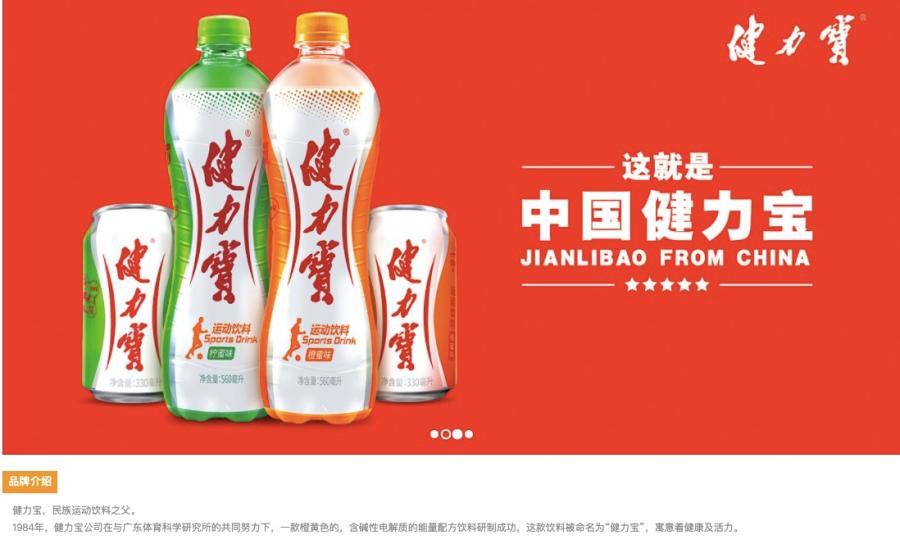
Screenshot of Jianlibao website.
But the title of "Father of National Sports Drinks" has not been known for a long time. From June 26, 1984 to June 26, 2020, this sports drink that has gone through 37 years of ups and downs has long since lost its former glory.
When it comes to Jianlibao these days, people often use questions such as "have you drunk it" to evoke the memory of the era, while the name "Chinese Magic Water" that was born with Chinese sports at that time seems to have been forgotten.
The first Olympic "Chinese magic water" shines together with the gold medal
In 1984, Li Jingwei, then the director of Sanshui Winery in Sanshui County, Guangdong Province, accidentally obtained a new sports drink formula from Ouyang Xiao, a researcher at the Institute of Guangdong Academy of Sports Sciences. Li Jingwei saw the business opportunity and immediately invested in the development. A few months later, a sports drink called "Jianlibao" was born.
Said to be the birth, in fact, Jianlibao at this time had neither a production line nor a sales channel. Li Jingwei believes that since it is a sports drink, of course it must rely on sports to make a name for itself.
Coinciding with the return of the Chinese sports delegation to the Olympic Games in 1984, Li Jingwei decisively funded the sponsorship, making Jianlibao a special drink for the Chinese delegation. Jianlibao brand sports drinks were able to compete with Chinese athletes in the 1984 Los Angeles Olympics.
The Chinese team’s return to the Olympic family shone in Los Angeles, winning 15 gold medals and placing fourth in the gold medal table. It also quickly attracted the attention of the international sports community, and from Xu Haifeng, Luan Jujie to Li Ning, the "Jianlibao" that appeared frequently next to Chinese athletes gradually attracted attention.
The attention peaked as the Chinese women’s volleyball team achieved a "three-peat" World Series title in Los Angeles.
In the semi-finals of the women’s volleyball team at the Los Angeles Olympic Games, the Chinese women’s volleyball team defeated the Japanese women’s volleyball team known as the "Witch of the East" and walked into the finals on their opponents, which also attracted great attention from the Japanese media.
A reporter for Tokyo Shimbun was surprised to find that Chinese women’s volleyball players were drinking a drink he had never seen before, and after learning about it, he published a lacy news release titled "Fast Attack by" Magic Water "?"
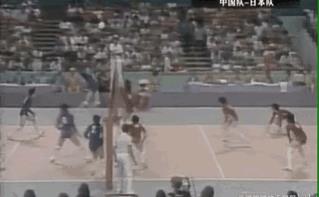
The Chinese women’s volleyball team defeated Japan at the Los Angeles Olympics to reach the final.
In the article, he speculated that "Chinese athletes won 15 Olympic gold medals, maybe because they drank some new sports drink with magical effects, Jianlibao," but he did not know that the new drink he had not seen was not even mass-produced and sold in China at that time, so it seemed very mysterious.
Later, his article was discovered by the Chinese media, which also covered the Los Angeles Olympics, and sent back to China with a report titled "China’s Magic Water" Sweeps Los Angeles.
News quickly spread that the collision of "Chinese magic water" and "Oriental witch", as well as the great success of the Chinese delegation in the Los Angeles arena, has greatly inspired national pride. As a special drink for the Chinese delegation, Jianlibao has also gained unimaginable attention.
Later, after research, in fact, the "Chinese magic water" in the original Japanese media report did not refer to Jianlibao alone, but the five drinks selected by the Chinese delegation, including Jianlibao.
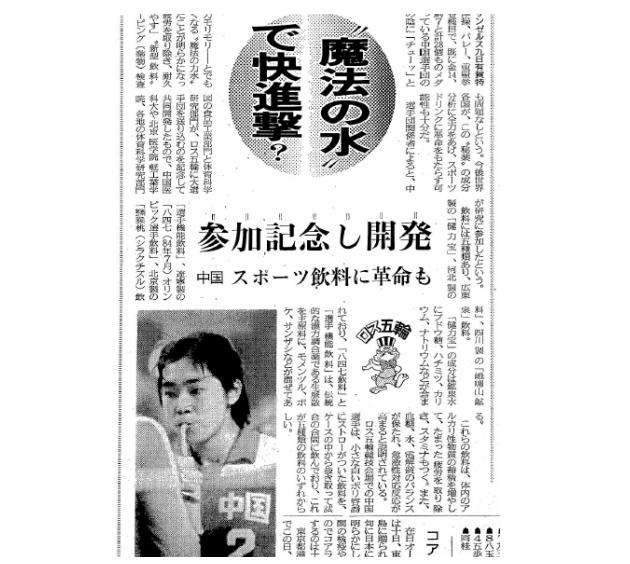
Japanese media reports.
The first relevant report that spread back to China was titled "Japan’s praise for our country’Jianlibao ‘as’magic water’ will cause a sports drink revolution", but in the process of being widely spread, the word "etc" gradually disappeared. Jianlibao was able to "enjoy glory alone" and quickly soared.
It is reported that in 1984, the first stage of Jianlibao sales have 3.45 million yuan, 1985 reached 16.50 million yuan. The next year, Jianlibao sales have reached 130 million yuan.
Of course, Jianlibao’s popularity did not rely solely on this "oolong" incident.
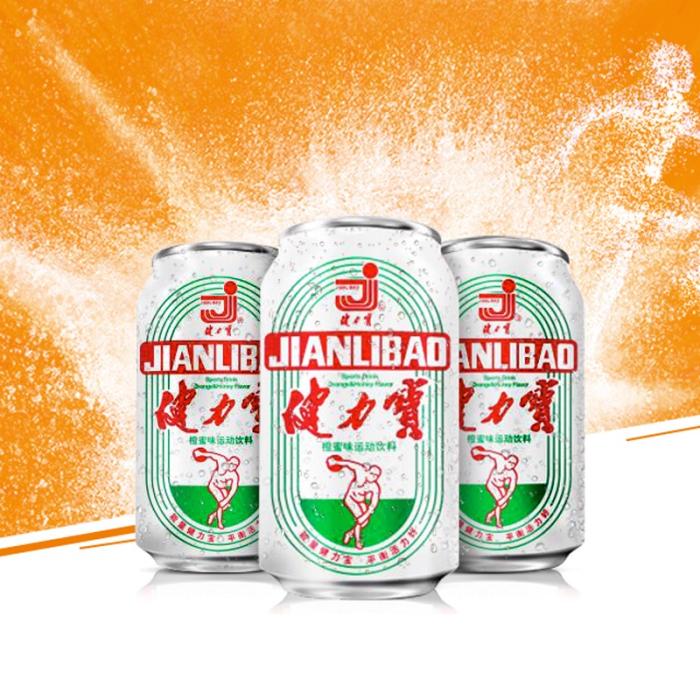
Jianlibao Classic Packaging.
Affinity sports, orange national drink rises "Jianlibao Star"
After the exposure of the Los Angeles Olympic Games, Jianlibao became famous in China. In 1985, Jianlibao Beverage was named the first national best sports drink, and then won the National Sports Science and Technology Progress Award, becoming the state banquet drink in the Great Hall of the People.
What followed was a proliferation of products and distributors, a geometric rise in sales, and for the next 15 years, it dominated the "first brand of national beverages".
After gradually opening up the market, Jianlibao has never forgotten the positioning of "sports drinks" and the marriage with Chinese sports.
In 1985, Jianlibao sponsored China Sports 500,000 RMB; a year later, they became the sponsor of the Chinese delegation at the 10th Asian Games.
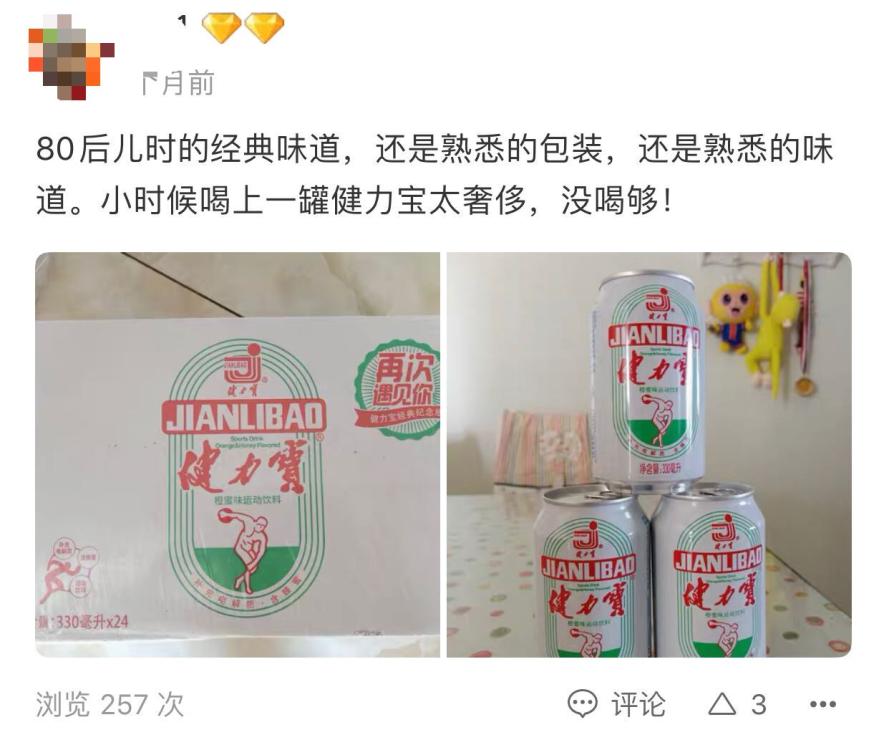
On the e-commerce platform, Jianlibao buyers’ comments.
In 1987, Guangdong Jianlibao Co., Ltd. was officially established, and they immediately invested 3.50 million RMB in the Guangzhou National Games that year, becoming the largest sponsor of the competition; in 1988, the first Olympic Games after the establishment of Guangdong Jianlibao Company, they logically joined forces with the Chinese Olympic Corps again and became the special drink for the Chinese delegation.
In the context of the vigorous development of Chinese sports, Jianlibao has risen rapidly through various sports events and entered a golden age.
In 1990, when Li Jingwei and his Jianlibao reached a cooperation with the Beijing Asian Games, he took out a super sponsorship of 16 million yuan, of course, in exchange for 750 million super orders and the market performance of China’s beverage industry in 1991.
Then, not content with this, Jianlibao Group and China Sports achieved another much-talked-about marriage.
In 1992, in order to compete for the 2000 Sydney Olympic Games and the 2002 and 2006 World Cups, the Chinese Football Association signed an agreement with Jianlibao Group to officially establish the Jianlibao Youth Football Team.
With the support of Jianlibao Company, a total of 29 teenagers from all over the country went to Sa ? o Paulo, Brazil for further study. Known as the "Jianlibao Project", a legend in the history of Chinese football began. At that time, the two sides of the cooperation could not have imagined that this relationship would bring about the peak of Chinese football in decades.
It’s not just Chinese football that has reached its peak.
On August 28, 1994, on the occasion of the tenth anniversary of Jianlibao, with the approval of the International Asteroid Nomenclature Committee, the Chinese Academy of Sciences Purple Mountain Observatory named its discovered asteroid 3509 as "Sanshui Jianlibao Star", the first star in the world to be named after a company. Jianlibao Company was in the limelight for a while.
Looking back at the list of "Jianlibao Junior" now, the names of Chinese stars who later became famous overseas, such as Sun Jihai, Sui Dongliang, Li Tie, Li Jinyu, Zhang Xiaorui, and Li Weifeng, are listed. According to the data, 10 of the team have been selected for the national team, and nearly 20 have played in the domestic top leagues. The Four Little Swans, including Li Jinyu, Li Tie, Sui Dongliang, and Zhang Xiaorui, are even more famous for a while.
However, in August 1998, due to the dispute over the ownership of the players, the Chinese Football Association announced the dissolution of the Jianlibao youth team, and Jianlibao’s first cooperation with Chinese football also ended.
Chinese football reached its peak in the early 21st century, but Jianlibao’s golden age ended before then.
Between right and wrong, the era mark of the national drink
Entering the 21st century, Jianlibao’s internal turmoil continued. First, there was a disagreement between the manager Li Jingwei and the actual control of the company, and then the leader who attracted much attention from the society changed several times. After all, Jianlibao failed to regain its former grandeur.
During this period, Jianlibao, which once gave up the sports drink route, also tried to pick up the "old friendship" again.
At the end of 2002, Jianlibao Group wholly acquired Shenzhen Football Club and renamed it Shenzhen Jianlibao Football Club the following year.
In 2004, the Jianlibao-named football club won its first league championship, becoming the first Guangdong team to win the top league of Chinese football, and qualified for the 2005 AFC Champions League.
Due to the transformation of the A-League into the Chinese Super League in 2004, the Shenzhen Jianlibao team also became the champion of the "first year" of the Chinese Super League. Soon after, they won the runner-up of the Chinese Super Cup and the third place of the Asian Champions League.
But the stellar results did little to help Jianlibao’s business performance this time around. Jianlibao has faded out of Chinese football for the second time after a stake transfer and multiple shareholder changes.
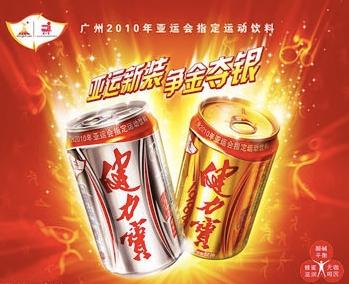
Jianlibao Guangzhou Asian Games promotional poster.
A few years later, when the Asian Games returned to Guangzhou, Jianlibao, which was at a low point, still obtained the qualification of designated sports drink sponsor with 80 million high sponsorship fee, trying to revive the Jianlibao brand through the Asian Games. But the orange ocean of the year failed to reappear.
There is a saying that people must rely on individual struggles, but they must also consider the historical process. The same is true of the success of Jianlibao back then. This "national drink", which has been inseparable from Chinese sports since birth, is imprinted with the changes of Chinese sports.
As pioneers of sports drinks in China, they hitched a ride and thrived on the success of Chinese sports under the wave of reform and opening up.
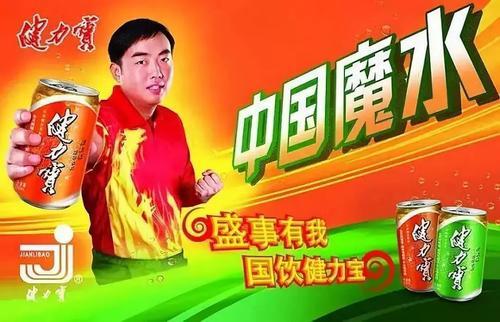
Jianlibao promotional poster.
Jianlibao, which started to develop together with the development of China’s sports reform, achieved its own "nationalization" development under the goal of sports socialization and became the first generation of beneficiaries of domestic sports marketing;
And when the professionalization of Chinese football was in full swing, Jianlibao also perfectly stepped on the step and branded its name in the history of Chinese football.
However, it is a pity that Jianlibao, which once accounted for the dividends of China’s sports development, has not been able to achieve transformation and upgrading with the process of deepening the reform of Chinese sports. After 37 years, "Jianlibao" has gone from a legend in sports history to a nostalgic symbol. This is certainly a feeling, but it has to be said that it is a pity.
The magic of "Chinese magic water" is gradually fading, and the beautiful memories of the generation of that year are also flowing in the times, turning into a sigh of emotion.
